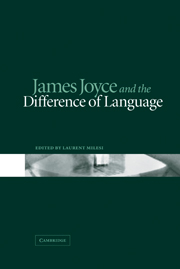Book contents
- Frontmatter
- Contents
- List of contributors
- Acknowledgements
- List of abbreviations
- Chapter 1 Introduction: language(s) with a difference
- Chapter 2 Syntactic glides
- Chapter 3 ‘Cypherjugglers going the highroads’: Joyce and contemporary linguistic theories
- Chapter 4 Madonnas of Modernism
- Chapter 5 Theoretical modelling: Joyce's women on display
- Chapter 6 The lapse and the lap: Joyce with Deleuze
- Chapter 7 ‘sound sense’; or ‘tralala’ / ‘moocow’: Joyce and the anathema of writing
- Chapter 8 Language, sexuality and the remainder in A Portrait of the Artist as a Young Man
- Chapter 9 Border disputes
- Chapter 10 Errors and expectations: the ethics of desire in Finnegans Wake
- Chapter 11 Ex sterco Dantis: Dante's post-Babelian linguistics in the Wake
- Chapter 12 No symbols where none intended: Derrida's war at Finnegans Wake
- Works cited
- Index
Chapter 10 - Errors and expectations: the ethics of desire in Finnegans Wake
Published online by Cambridge University Press: 22 September 2009
- Frontmatter
- Contents
- List of contributors
- Acknowledgements
- List of abbreviations
- Chapter 1 Introduction: language(s) with a difference
- Chapter 2 Syntactic glides
- Chapter 3 ‘Cypherjugglers going the highroads’: Joyce and contemporary linguistic theories
- Chapter 4 Madonnas of Modernism
- Chapter 5 Theoretical modelling: Joyce's women on display
- Chapter 6 The lapse and the lap: Joyce with Deleuze
- Chapter 7 ‘sound sense’; or ‘tralala’ / ‘moocow’: Joyce and the anathema of writing
- Chapter 8 Language, sexuality and the remainder in A Portrait of the Artist as a Young Man
- Chapter 9 Border disputes
- Chapter 10 Errors and expectations: the ethics of desire in Finnegans Wake
- Chapter 11 Ex sterco Dantis: Dante's post-Babelian linguistics in the Wake
- Chapter 12 No symbols where none intended: Derrida's war at Finnegans Wake
- Works cited
- Index
Summary
In the final version of the letter in Finnegans Wake, the one most directly linked to ALP, she remarks: ‘Well, here's lettering you erronymously anent other clerical fands allieged herewith’ (FW 617.30–1). The author of the letter, who goes by various names in this book, including that of ALP herself, suggests here that she writes anonymously. As Yawn's interrogators have already stressed, the Wake itself is a letter ‘selfpenned to one's other’ (FW 489.33–4). That the letter is ‘selfpenned’ suggests that it is addressed to the self who pens it; that it is penned to one's other suggests that the self is the other, so that the letter can be said to be from the other to the other. In terms of its ultimate sender and receiver, or its origin and end, the letter is anonymous, though one could argue that particular subjects – for example, Maggie, ALP, Issy, Shem, Shaun, and so forth – mediate the other in themselves insofar as they occupy the location of the sender or the receiver. Shem as the writer who transcribes the speech of the mother, Shaun as the postman who carries the letter from sender to receiver, both signify the subject as a figure of mediation between the radical alterities that the women embody as objects of HCE's or the sons's patriarchal desires. In some sense, the letter comes from and goes back to the women.
- Type
- Chapter
- Information
- James Joyce and the Difference of Language , pp. 161 - 179Publisher: Cambridge University PressPrint publication year: 2003



